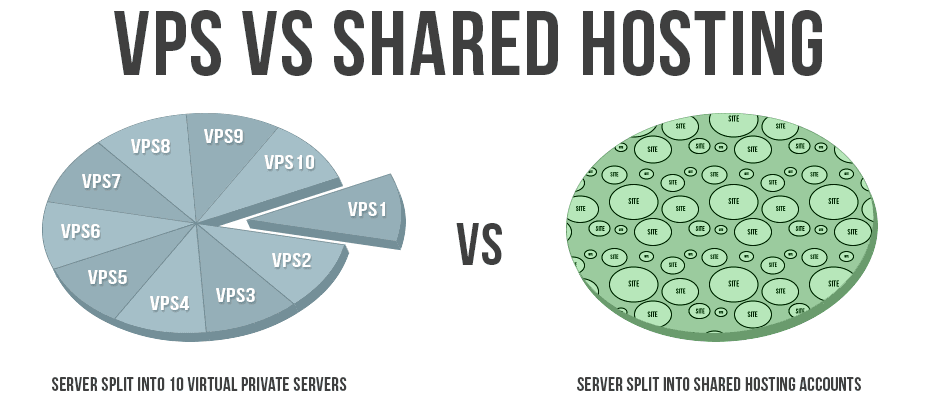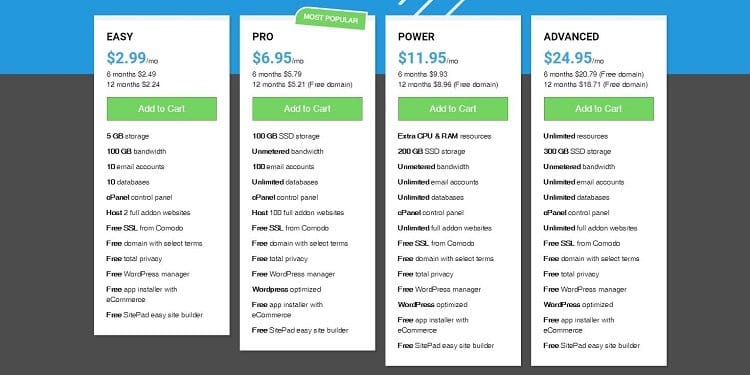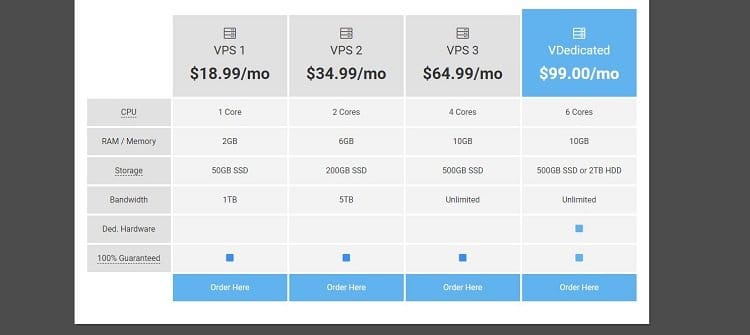Web hosting is one of the core components of your digital arsenal, since it is where you store all the files needed for visitors to access your site. However, due to the various needs that websites have, not all web hosting is the same.
Because of this, web hosts offer various types of plans which you can choose from. These plans are usually incremental in capabilities, with price tags that follow accordingly. At the very bottom rung of the ladder is shared hosting, which is what most people would start off with.
Today, I’ll be going through two key types of web hosting plans and explaining some of the benefits of each; Shared Hosting and VPS hosting.

What is Shared Hosting?
Shared hosting, as the name implies, is when many users share the same space on one web server. Think of it like living in an apartment complex where many families share common resources such as a swimming pool and power and water mains.
Because the infrastructure is shared among everyone who is on the same shared hosting plan (or on each server anyway), shared hosting is the cheapest web hosting you can opt for. It allows you a quick step into the world of web hosting and can be a learning experience as well.
Benefits of Shared Hosting

Affordable
Because many users are sharing all the resources of a single server, the cost to the web hosting company remains restricted to that server. Hence, the more users a web host packs onto a single shared server, the lower the cost is likely to be. Imagine one computer that sees shared usage among 100 to 300 people.
Shared web hosting is the cheapest web hosting available to build a website. Prices vary from host to host, but you will likely be looking at a cost of not more than a few dollars per month on average. There are some free-shared hosting plans available, but those are usually extremely restrictive.
Support Included
With shared hosting, all your hardware needs are met by the web hosting company. There is no need for you to be concerned about equipment upgrades and maintenance. Often, all you must consider is your own website and its operation. This removes much of the technical skills required to keep a web host running.
Ease of Use
Aside from the elimination of hardware maintenance, there are also often specialized interfaces that are provided for you to manage your shared web hosting account. This makes the experience very easy, even for those unfamiliar with web hosting.
Yes, there will be terminology and concepts to pick up on, but the learning curve is much less steep compared to having to maintain an entire server. Many options are often 1-click operations and even for some things which need configuration, the web host often has simplified guides or technical staff to assist you.
Scalability
Even in shared hosting, there are usually different tiers. It is usually recommended to start at the lowest tier (unless your site has specific requirements) because the plans are extremely flexible. As an example, I started off one of my websites with the lowest tier of a shared hosting plan. Once the traffic grew and needed more resources, I was able to scale up to a better plan with just a single email to notify my host.
This flexibility is one of the things that makes web hosting plans great. Web hosts are more than happy to help you scale up with them, and you only need to scale up if your current plan isn’t providing you with the resources you need. Your visitor volume is also usually tied to your business value – so as you earn more, you’ll pay a little more for hosting.
Yet, even with all these advantages, there may come a time when even the most powerful shared hosting plan may not fit your needs any longer. This is a good thing since it means that your site is successful, and your business is thriving. At that point, it might be time to consider migrating on to VPS hosting.
What is VPS Hosting?
VPS hosting is like shared hosting in some ways. You are still physically on the same server as other users but are enclosed in a siloed environment. The biggest difference between shared hosting and VPS hosting is the allocation of server resources.
This means that if you move on to VPS hosting, you will be guaranteed a certain amount of resources specifically for your site alone.
Because you are paying for dedicated resources, VPS hosting is often a step-up in pricing compared to shared hosting, but not terribly much so. Again, prices depend on what the plan includes, but there are generally other benefits as well.
Benefits of VPS Hosting

Reliability
Because you are spaying for a siloed environment where you are guaranteed resources, your website will be more reliable. In normal shared hosting, if another site on the server you are using is experiencing high traffic volume, your site performance may suffer. Since VPS hosting gives your website specific resources, you can estimate site performance with fewer unknown variables.
Manageable Costs
VPS hosting in some ways is still like shared web hosting, so your web host can still have many VPS accounts on a single server. This means that the scale-up cost isn’t terrible more than shared hosting, so you can expect to pay much less than what a dedicated server would cost while reaping some of the benefits.
Greater Control
This portion is why I usually recommend first-time users experience shared hosting first. VPS hosting comes with greater control options, but that may need some experience to manage. For example, you can install and manage some applications on your own.
Still, you will continue to have access to technical support to help if there is a need for it. Some VPS plans are managed, meaning that the price is slightly higher, but the host will take over the management of the technical aspects of your plan for you.
Better Security
Since VPS hosting is usually what you move on to when your site has higher traffic volume, you will be glad to know that VPS plans often have better security features. As an example, remember that siloed effect I discussed earlier?
Being in a contained ‘bubble’ with other users on the same server means that your site is kept safe even if there are issues with other websites sharing that space. Your data and files will always remain confidential in your own private environment.
Conclusion
As you can see from what I have discussed here, the comparison of shared hosting to VPS hosting isn’t necessarily a linear one, but transitional. Most new users should be content with standard shared hosting and then be able to scale up their hosting plan according to the volume of site traffic they grow to.
Once shared hosting plans can no longer cope with your site traffic, then it might be time to consider moving on to VPS hosting. Thankfully, most web hosts will usually offer both shared and VPS hosting, so you likely will not have to look far for an upgrade.

